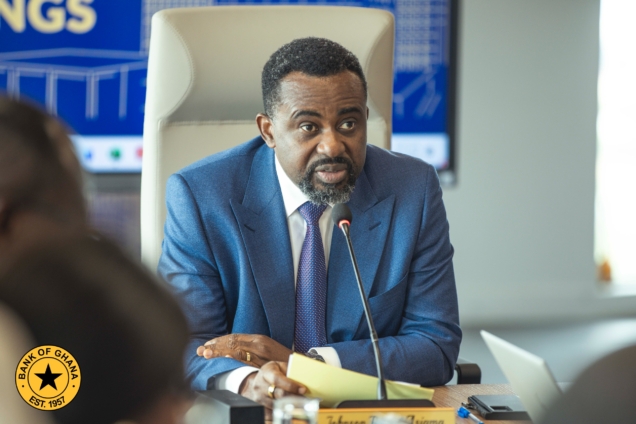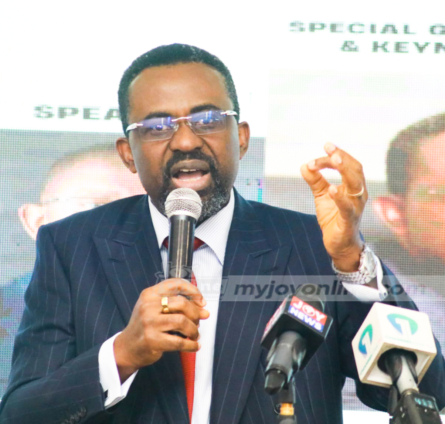Business
BoG Issues Warning To Banks And Public Over 10 Unlicensed Money Transfer Services

The Bank of Ghana (BoG) has issued a strong caution to the public, banks, dedicated electronic money issuers (DEMIs), and enhanced payment service providers (EPSPs), urging them not to engage in any transactions with ten money transfer organisations that are operating in the remittance and foreign exchange markets without the necessary regulatory approval.
The entities involved include Ace Money Transfer, Remit Union, Remit Home, Roze Remit, Monty Global, Nairagram, I-Transfer, Hurupay, Eversend, and Izi Send.
“By this notice, all market players are reminded of the above directives and entreated to comply accordingly”, a statement released by the BoG on June 27, 2025, said.
The BoG emphasized that any institution that fails to adhere to this directive will face strict sanctions, which may include the revocation of its operating license.
“Approved money transfer organisations are reminded to terminate their foreign exchange flows through their partner institutions only and to adhere strictly to all the guidelines in respect of their operations”.
The statement further clarified that Section 3.1 of the Foreign Exchange Act, 2006 (Act 723) stipulates: “a person shall not engage in the business of dealing in foreign exchange without a licence issued under this Act”.
It also referenced Section 15.3 of the same Act, which provides that “each transfer of foreign exchange to or from Ghana shall be made through a person licensed to carry out the business of money transfers or any other authorised dealer.”
“The Public, Banks, Dedicated Electronic Money Issuer (DEMI) and Enhanced Payment Service Providers (EPSP) are by this Notice cautioned to desist from dealing with any of these institutions”.
Business
People Carrying Over $1m Out Of Ghana Without Declaring – BoG Governor Reveals

“People are carrying more than a million dollars out of Ghana without declaring it,” Bank of Ghana Governor Dr Johnson Asiama has revealed.
Speaking on Joy News’ yet-to-be-aired PM Express Business Edition, he described such practices as major leakages that threaten the stability of the economy and undermine efforts to fight money laundering.
“If you look at the currency declaration context framework, for example, the intel we got was that some people actually take out, you know, large volumes of cash.
“People are carrying over a million dollars just out of Ghana, without declaring these, those are leakages, right?” Dr Asiama said.
“And so as a regulator, it is for us to work together with the other regulators, GRA and the others to ensure that if you have to carry such large sums, these are accounted for.
“These are declared. The sources are known. And don’t forget, that’s also good for the anti-money laundering fight that we have on our hands.”
The Governor stressed that the central bank’s recent market notices are not arbitrary but are aimed at sealing such loopholes.
He said the Bank of Ghana is redefining the framework to ensure efficiency and accountability in financial transactions.
“We are just, you know, redefining the framework within which the market has to work and work efficiently.
“These are things we should have been enforcing, but given the context in which we are, we’ve seen clearly that we need to set those boundaries clearly so that the markets can function and function properly,” he explained.
Dr Asiama dismissed suggestions that the Bank of Ghana is overreacting to pressures in the financial market.
“No, not at all. We are only taking advantage of what we are seeing to fix the market. It is like you have a soccer match, right? There’s a context within which the game has to be played, and so that’s exactly what we are doing.”
On the controversial notice restricting large withdrawals, he justified the move, citing findings from the central bank’s investigations.
“If you look at one of the notices, for example, on large withdrawals, that again was in response to the feedback that we got from our investigations, where you find certain corporates who earned money through export rights into their FCA accounts, and then they would want to withdraw these in large amounts.
“Imagine a corporation wanting to withdraw $10 million over the counter. The fact is, what do they use that for? Because their payments are abroad, they don’t carry physical cash to go and settle anything.
“And so the point we made there was that corporations like that do not need that cash locally. Any payments they want to make abroad will be made anyway. And so we said no, for such corporations, they can afford to play in that regime.”
He noted that ordinary individuals would not be affected in the same way.
“For individuals like you and me, probably you need your few $100 or $200 to do something, that’s understandable.
“You can negotiate with your bank, and then you would have a choice whether you want to take those few dollars, or you want to pay the commission, or you want them to change it into cedis for you; you are at ease to do that.”
The Governor insisted that the measures were well thought through, with full involvement of the banking sector.
“Let me also explain that we do not just issue these notices. We met with the banks. We met with the CEOs of banks a number of times. We took on board the feedback from them.
“And so you will see that the banks are silent. They are not complaining. It’s because they were consulted. We thought through this together before the notices were issued. And so we are confident that the notices will help.”
myjoyonline.com
Business
Price Of Petroleum Products Expected To Go Up By Some Significant Margin Per Litre From September 1

The price of petroleum products is set to go up by some significant margin per litre from Monday, September 1, 2025.
This is based on the outlook report that guides the pricing of the Oil Marketing Companies (OMCs) in the country by the Chamber of Oil Marketing Companies (COMAC), as seen by JOY BUSINESS.
Projected Prices at Pumps
Based on the report, the price of petrol at the pumps is projected to increase by 3.86 – 5.40% per litre from September 1, 2025. The development could result in a litre of petrol going for GHS 13.67.
LPG will be increased by up to 4.57% per kilogram.
Diesel, on the other hand, could be up by 3.39% per litre, and this may result in a litre going for GHC14.35.
Reasons
According to the COMAC, the hike has been influenced by the cedi experiencing some substantial depreciation against the US dollar over the past month.
According to the chamber, the rate shifted from GHS 10.71 to GHS 11.20, reflecting 3.98 per cent, the “highest since the start of this year”.
The Chamber of Oil Marketing Companies, however, in the report revealed that crude oil on the international market has been dropping; the price of petrol was down by 0.45%, diesel by 3.73%, and LPG by 1.73%.
Some of the industry players have argued that the recent 1 cedi levy on some petroleum products may have also contributed to the margin of increase.

Cedi’s Depreciation and Supply Challenges
The Chamber in the report argued that despite the reduction in international petroleum prices, the increment was “due to depreciation of the cedi against the dollar.”
Additionally, the recurring shortfall in supply of finished petroleum products, particularly petrol from earlier this month, also accounted for the increase in prices.
JOY BUSINESS reported last week that the market had been hit with some supply challenges, especially when it comes to petrol.
That actually forced some of the oil marketing companies to increase their prices from the middle of August 2025, when prices should have been kept unchanged.
myjoyonline.com
Business
Pricing, Advertising In Dollars Illegal – BoG Warns

The Bank of Ghana has reminded the public that unlicensed or unauthorised dealings in forex activities (black market transactions), pricing/quoting, advertising, issuing receipts, receiving and/ or making payments for goods and services in foreign currency, particularly the United States Dollars in Ghana, are strictly prohibited under the Foreign Exchange Act,2006 (Act 723).
It is therefore advising institutions, both public and private and individuals engaging in such practices to immediately cease.
In a statement, the Central Bank, the Ghana Cedi remains the only legal tender in Ghana. “Accordingly, no resident of Ghana, unless duly licensed or authorised by the Bank of Ghana, shall price, advertise, invoice, receive or make payment in any foreign currency for goods and/or services, including but not limited to school fees, sale and rental of vehicles, sale and rental of real estate, airline tickets, domestic contracts, retail shopping, online sales and Hotel accommodation”.
“Foreign currency invoices may be issued only to expatriates (foreign nationals) or non-residents and proceeds from such transactions shall be paid into a Foreign Exchange Account (FEA) with any licensed bank. Exchange rates quoted and applied on invoices must reflect prevailing market rates of commercial banks and be benchmarked against the Bank of Ghana’s published reference rate and not arbitrarily determined”, it stated.
The Central Bank further emphasised that foreign exchange remains transferable through the banking system for legitimate external payments, subject to applicable regulatory thresholds and commercial banks’ internal processes.
It concluded by saying, they will continue to enforce compliance, and violators will be subject to sanctions and appropriate legal action in accordance with Act 723.
myjoyonline.com
-

 News5 months ago
News5 months agoGH¢49m Spyware Scandal: Ex-NSB Boss’s Claims Lack Credibility – Bright Simons
-

 Opinion5 months ago
Opinion5 months agoA LETTER TO GES
-

 Showbiz5 months ago
Showbiz5 months agoBogo Blay – Woman (Produced By FimFim)
-

 Showbiz5 months ago
Showbiz5 months agoKofi Kinaata Honoured with “Youth in Entertainment” Award at 2025 Millennium Excellence Awards
-

 Showbiz5 months ago
Showbiz5 months agoWebz – Odo | MP3 Download
-

 Sports5 months ago
Sports5 months agoEl Clásico Thriller: Barcelona Edges Real Madrid 4–3 in Seven-Goal Spectacle
-

 News5 months ago
News5 months ago‘Not Chosen by Merit’ – Ghanaian Prophet Predicts Short Papacy for Pope Leo XIV
-

 People & Lifestyle5 months ago
People & Lifestyle5 months agoThe differences between ‘I love you’ and ‘I’m in love with you’






















































